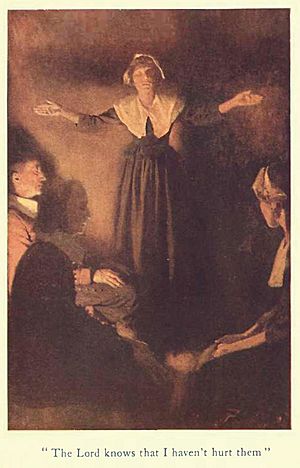Rebecca Nurse facts for kids
Quick facts for kids
Rebecca Nurse
|
|
|---|---|

Nurse in a picture from a 1907 book
|
|
| Born |
Rebecca Towne
February 21, 1621 |
| Died | July 19, 1692 (aged 71) |
| Cause of death | Execution by hanging |
| Nationality | English |
| Occupation | Housewife |
| Known for | Convicted of witchcraft during the Salem Witch Trials |
| Spouse(s) |
|
| Children |
|
| Parent(s) |
|
| Relatives |
|
Rebecca Towne Nurse (born February 21, 1621 – died July 19, 1692) was an elderly grandmother. She was accused of witchcraft during the famous Salem Witch Trials in 1692. At 71 years old, she was known as a very religious woman.
Her execution was a major event in the trials. After her death, many people started to question if the accusations were true. They began to doubt the girls who claimed to be harmed by those accused of witchcraft.
Contents
Early Life and Family
Rebecca Nurse was born in Great Yarmouth, England, in 1621. In 1644, her family moved to Salem Village, which is now Danvers, Massachusetts. Around the same year, she married Francis Nurse. He was a skilled craftsman who made wooden trays, cups, and other useful items. People in the colony respected them greatly because of his unique skills. Rebecca and Francis had eight children together.
Accusation and Trial
The Nurse family and the Putnam family in Salem had disagreements over land. On March 23, 1692, a warrant was issued for Rebecca's arrest. She was suspected of witchcraft. The Putnam family played a role in her arrest. Many people in the village were upset that she had been accused. She was 70 years old and known for her strong faith.
Her trial started on June 30, 1692. Many people spoke up for her, saying she was a good person. However, some young girls in the community claimed that Rebecca was tormenting them. At first, the jury found her not guilty of witchcraft. But some people wanted her to be found guilty. They asked the judges to think about their decision again. The judges did, and then Rebecca was found guilty.
After Her Execution
After Rebecca Nurse was executed, her body was buried in a shallow grave. This was the custom for people who were executed. Their bodies were not allowed to be buried in a churchyard.
However, it is believed that Rebecca's family secretly returned after dark. They dug up her body and buried it properly on their family land. Her exact burial spot is not known for sure. In 1885, her family members put up a tall granite memorial for her. It is in the family plot at the Rebecca Nurse Homestead cemetery in Danvers. The words on the monument include a poem by John Greenleaf Whittier.
In 1706, one of Rebecca's accusers, Ann Putnam, Jr., apologized for her actions. She worked with the local minister, Reverend Joseph Green, to write a confession. Ann Putnam, Jr. read her apology to the church on August 25, 1706. She said she was very sorry for what she had done to Rebecca and her two sisters, Mary Eastey and Sarah Cloyce.
The Nurse family lived in their home for many generations. In 1784, the Rebecca Nurse Homestead was sold to Phineas Putnam. He was a cousin of Rebecca's great-great-grandson. The Putnam family lived there until about 1905. By 1909, volunteers helped save the farm. It became a historic house museum. It includes the original house and cemetery.
Rebecca Nurse is a character in Arthur Miller's play The Crucible. In 2021, a book about her life was published. It was called A Salem Witch: The Trial, Execution, and Exoneration of Rebecca Nurse.
Notable Descendants
Rebecca Nurse is an ancestor of several well-known people. These include Vincent Price, Mitt Romney, Zach Braff, Amy Grant, and Lucille Ball.
Images for kids
-
The Rebecca Nurse Homestead in 2006
See also
 In Spanish: Rebecca Nurse para niños
In Spanish: Rebecca Nurse para niños



